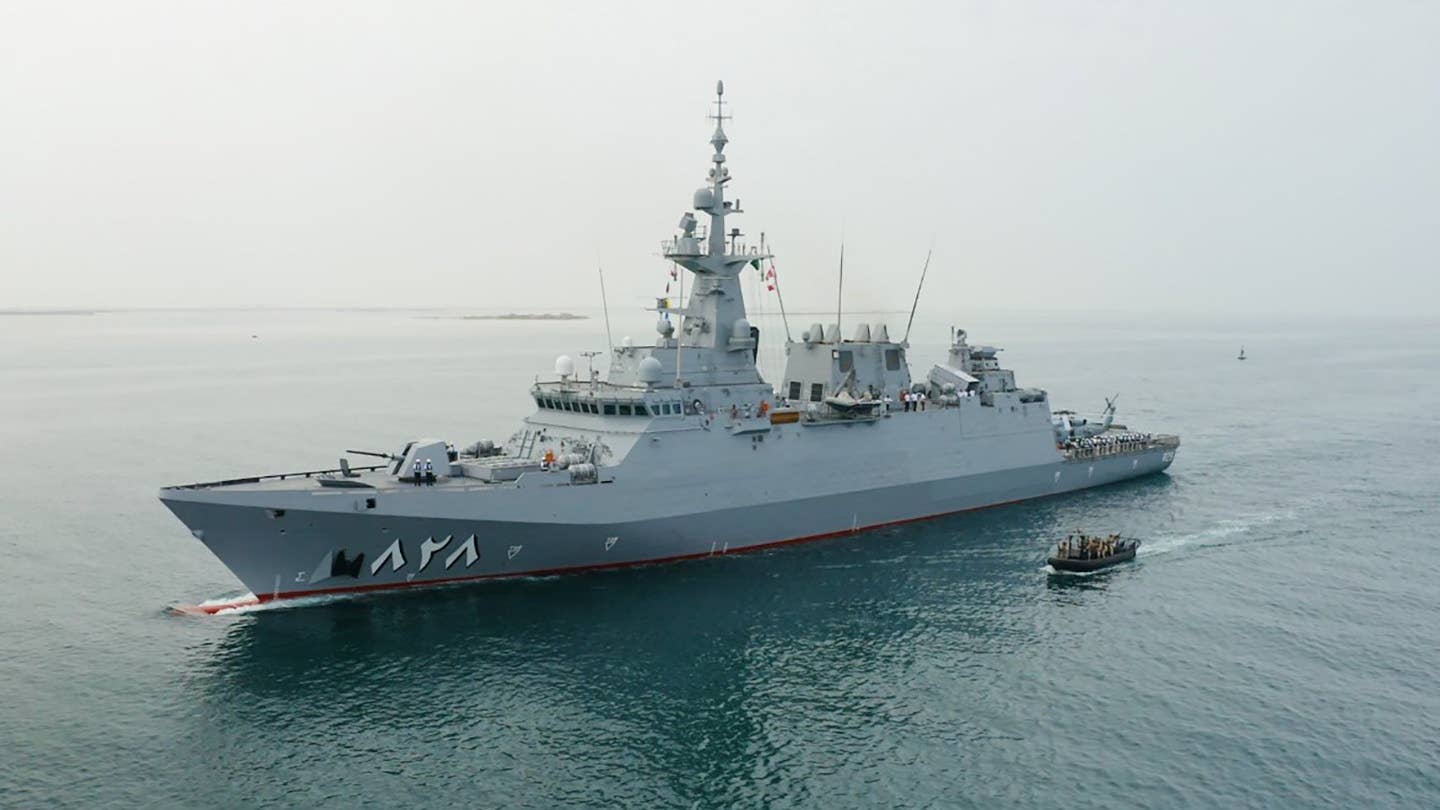Only one Arab country has joined Operation Prosperity Guardian even though Iranian-backed Houthis threaten shipping in their region.

Saudi Arabia has almost 1,000 miles of Red Sea shoreline with several major ports and has fought a nearly decade-long bloody war with the Houthis in neighboring Yemen. Despite that, Riyadh is among the vast majority of Arab nations who have passed on taking part in Operation Prosperity Guardian (OPG). The U.S.-led operation was created last month to provide greater security for ships transiting the Red Sea, Gulf of Aden, and Bab al-Mandab Strait.
Retired Saudi Rear Adm. Hatem Albesher told The War Zone there were several reasons why Bahrain is the lone Arab nation to join OPG. His thoughts further confirms our initial analysis about the Red Sea turmoil, and who would take part in dealing with it and why.
The Arleigh Burke-class guided-missile destroyer USS Carney (DDG 64) fires a Standard Missile (SM) 2 to defeat a combination of Houthi missiles and unmanned aerial vehicles in the Red Sea, Oct. 19, 2023. (U.S. Navy photo by Mass Communication Specialist 2nd Class Aaron Lau)
Chief among the reasons for Arab reticence is the ongoing Israel-Hamas war, said Albesher, now chairman of the Saudi Maritime Center for Consultation & Services, created to promote the growth and sustainable development of Saudi Arabia’s maritime industry.
“Currently, apart from Bahrain, Arab nations are not directly involved in the operation,” he said. “This is because they may have reservations about joining a coalition that aims to support Israel and counter economic repercussions [against it.]”
“Riyadh and Abu Dhabi are not currently interested in the coalition project, despite the importance of the Red Sea’s ports for Saudi imports” because “both countries prioritize de-escalation with the Houthis to focus on their own strategic interests,” Albesher said.
The Saudis have not joined an international effort to protect Red Sea shipping despite the economic impact on its ports, a retired Saudi rear admiral said. (Google Earth image)
This approach, however, is paradoxical given the costs the Houthis are imposing by shutting down Red Sea commerce.
“Collaborative efforts are crucial to safeguard navigation freedom, protect sea lines of communication, and ensure maritime trade route safety in the Red Sea/[Bab al-Mandab] region,” said Albesher. “However, the self-distancing policy of the Saudi-led Coalition and countries in the Red Sea region towards Houthi attacks may encourage Iran’s influence over the maritime lane between the Strait of Bab Al-Mandab and the Suez Canal.”
Iran, he said, “has the potential to provide intelligence and threaten to close maritime straits. The aggression and violent military actions by Israel in Gaza have given Iran’s proxy, the Houthis, a reason for the Arab Nation to believe that Operation Prosperity Guardian may not be necessary.”
However, “the continued attacks on ships show that the active participation of Arab nations is crucial for ensuring the security and stability of the Red Sea/[Bab al-Mandab] region.”
That includes Egypt, said Albesher. As we have previously reported, Egypt, which owns the Suez Canal, also has a major interest in the success of OPG, with nearly $10B a year in revenue earned from canal operations.
“The Suez Canal is a crucial maritime trade route connecting the Red Sea to the Mediterranean Sea, and any disruption or tension in the region could pose a threat to Egypt’s economy,” he said. “Therefore, Egypt has a vested interest in ensuring stability and security in the Red Sea/[Bab al-Mandab] region to protect the smooth operation of the Suez Canal.”
The Saudi reluctance to join OPG comes even as it recently took a leadership role in another joint maritime effort. In August, the Royal Saudi Navy took command of Task Force 152, tasked with providing maritime security in the Arabian Gulf.
Vice Adm. Brad Cooper, commander of U.S. Naval Forces Central Command, U.S. 5th Fleet and Combined Maritime Forces, center; observes Royal Bahrain Naval Force Capt. Mohamed Almeer, left; and Royal Saudi Navy Capt. Assem Alamri, new commander of Combined Task Force 152; salute during a change of command ceremony in Manama, Bahrain, Aug. 27, 2023. (Photo by Mass Communication Specialist 2nd Class Naomi Johnson)
Earlier Monday, U.S. Secretary of State Antony Blinken met with Saudi Arabia’s Crown Prince Mohammed bin Salman in Al ‘Ula to discuss, among other things, the role Riyadh can play in deterring Houthi attacks on commercial shipping in the Red Sea.
The lack of participation by Arab nations is not a death blow for OPG, Albesher said.
“The success of Operation Prosperity Guardian depends on various factors, such as the coordination and cooperation among participating nations, the effectiveness of military strategies, and the ability to address the root causes of instability in the region,” he said. “While Saudi Arabia’s involvement can bring valuable resources and capabilities to the operation, the absence of any specific country, including Saudi Arabia, does not necessarily mean that the operation will fail.”
So far, while more than 20 nations have joined OPG, only five – the U.S., U.K., France, Greece and Denmark – have or will contribute warships. The U.S. Navy officer in charge of OPG, Vice Admiral Brad Cooper, Commander of U.S. Naval Forces Central Command (NAVCENT), said last week that he has a “sufficient number of assets to execute the tasking I’ve been given.” That includes aviation assets as well as ships.
For the Saudis and other Arab nations, there are many reasons to let the U.S. and NATO allies bear the brunt of protecting the Red Sea. They don’t have to commit their own resources. They don’t have to appear to be working to benefit the Israelis in any way. They don’t have to anger Iran or risk rekindling the long, bloody conflict in Yemen. The U.S. and a handful of other countries are already doing it for them.
Still, the growing Royal Saudi Navy, in particular, as well as assets from other Arab militaries would prove a very beneficial to OPG’s goal of protecting Red Sea shipping. The fact that they are not present is a glaring indication of the shifting geopolitical realities in the Middle East.
Contact the author: howard@thewarzone.com


